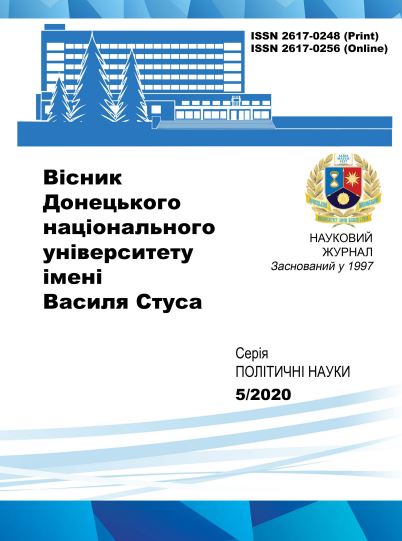Dynamics of Russian digital political discourse
DOI:
https://doi.org/10.31558/2617-0248.2020.5.3Keywords:
political discourse; authoritative regime; Russia; political emotions; negativity; intertextualityAbstract
In the digital world, political actors have been getting plenty of possibilities for a direct communication with society, without mass media participation. In democratic countries formats and structures of official discourses has been transforming in order to use the possibility. However, changes in authoritarian discourses are not studied properly. In the paper Russian political discourse transformation is considered (four indicators are taken into account). The interrelations of official (president’s site) and non-official (internet-site «Lenta.ru») is observed between 2005-2019. The analysis is conducted with computer programs, written in Python. The calculation of the indicators (emotionality, negativism, intertextuality (direct and indirect) shows, that the discourse has low activity. There is no rapprochement between the official and non-official components. Thus, the reorientation of the official discourse towards direct communication and the discourse usage for the political struggle is indistinctive. Low level of political interrelations, which may be explained with some peculiarities of Russian political regime, leads to low indicators of emotionality and negativity for the official (0,03; 0,03) and non-official (0,2; 0,19) discourses. Additionally the direct intertextuality isn’t typical for Russian official discourse – it’s true for the whole period of observation (0,003), direct intertextuality has been less salient since 2010 (0,9). The indicators for the non-official discourse are larger (0,04 – indirect; 0,15 – direct), although, in comparison with other democratic states, these number are enough for reach forums of ideas functioning in the political sphere. Thus, as a rule, Russian political actors don’t create messages, attractive for audiences, in order to disseminate the texts in both official and non-official discourses. To sum up, texts’ formats and structure transformation is indistinctive for Russian political discourse, and in the digital reality this makes the direct interrelations between political actors (officials) and society a problematic one.
References
Balzer H. Managed Pluralism: Vladimir Putin's Emerging Regime. Post-Soviet Affairs. 2003. № 19(3), 189-227. DOI:10.2747/1060-586X.19.3.189
Biryukov N., Sergeev V. Russian Politics in Transition Institutional Conflict in a Nascent Democracy. Abingdon: Routledge, 2018.
Blassnig S., Ernst N., Buchel F., Engesser S., Esser F. Populism in Online Election Coverage. Journalism Studies. 2019. № 20(8), 1110-1129. DOI:10.1080/1461670X.2018.1487802
Broersma M., Graham T. S. Twitter as a news source: How Dutch and British newspapers used tweets in their news coverage, 2007–2011. Journalism Practice. 2013. № 7(4), 446-464.
DOI: 10.1080/17512786.2013.802481
Chadwick A. The Political Information Cycle in a Hybrid News System: The British Prime Minister and the “Bullygate” Affair. International Journal of Press/Politics. 2011, № 16 (1), 3-29.
Evans A. B. Power and Ideology: Vladimir Putin and the Russian Political System. Pittsburgh: The Carl Beck Papers, 2008.
Gel'man V. The Politics of Fear. Russian Politics & Law. 2015, № 53 (5-6), 6-26. DOI: 10.1080/10611940.2015.1146058
Hanson S. Instrumental Democracy: The End of Ideology and the Declibe of Russian Political Parties. In The 1999-200 Elections in Russia Their Impact and Legacy / Hesli V., Reisinger W. New York: Cambridge University Press, 2003, 163-185.
Heiss R., von Sikorski C., Matthes, J. Populist Twitter Posts in News Stories: Statement Recognition and the Polarizing Effects on Candidate Evaluation and Anti-Immigrant Attitudes. Journalism Practice. 2019. № 13, 20-38. DOI: 10.1080/17512786.2018.1564883
Il’chenko M. Inertia in Russian Politics. Russian Politics and Law. 2012. № 50 (3), 70-81.
Kryshtanovskaya O., White, S. (2009). The Sovietization of Russian Politics. Post-Soviet Affairs, № 25(4), 283-309. doi:10.2747/1060-586X.24.4.283
Linz J., Stepan A. The Problems of "Stateness" and Transitions: The USSR and Russia. In Problems of Democratic Transition and Consolidation: Southern Europe, South America, and Post_communist Europe / Linz J., Stepan A. – editors. Baltimore: The John Hopkins University Press, 1996, 366-400.
López-Rabadán P., Mellado C. Twitter as a space for interaction in political journalism. Dynamics, consequences and proposal of interactivity scale for social media. Communication & Society. 2019. № 32 (1), 1-18. DOI:10.15581/003.32.1.1-18
Molchanov M. Political culture and national identity in Russian-Ukrainian relations. College Station: Texas A&M University Pres, 2002.
Nichol, J. Russian Political, Economic, and Security Issues and U.S. Interests. Congressional Research Service, 2014.
Sakwa R. Russian politics and society. Routledge: London and New York, 2002.
Sakwa, R. Democratization. In Routledge Handbook of Russian Politics and Society / Gill G., Young J. – editors. Abington: Routledge, 2012, 33-44.
Schulmann, E. The Russian political system in transition Scenarios for power transfer. Oslo: Norwegian Institute of International Affai, 2018.
Stetka V., Surowiec P. Facebook as an Instrument of Election Campaigning and Voters’ Engagement: Comparing Czechia and Poland. European Journal of Communication. 2019. № 34 (2), 121-141. doi:10.1177/0267323118810884
Thompson M. Enough Said: What's Gone Wrong with the Language of Politics? New York: St. Martin's Press, 2016.
Zamyatin K. Russian Political Regime Change and Strategies of Diversity Management: From a Multinational Federation towards a Nation-State. JEMIE. 2016, № 15(1), 19-49.

